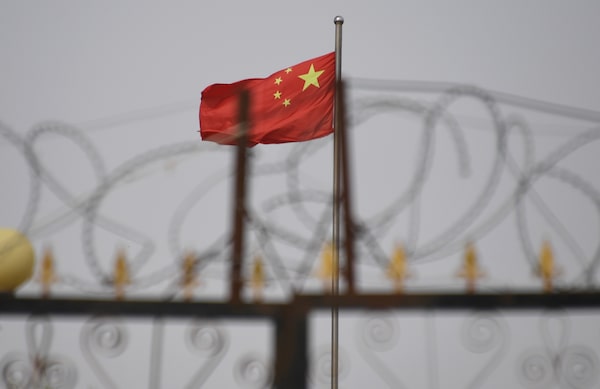
The Chinese flag behind razor wire at a housing compound in Yangisar, south of Kashgar, in China's western Xinjiang region, on June 4, 2019.GREG BAKER/AFP/Getty Images
Trade lawyers and human-rights advocates say the actions Canada announced to combat forced labour in China this week are more style than substance.
And one of Canada’s most prominent activists on the issue is calling on Ottawa to follow the United States in a full ban of cotton and tomato products from China’s Xinjiang region.
Earlier this week, the Canadian government announced a “comprehensive approach” to “defending the rights of Uyghurs and other ethnic minorities” in China’s Xinjiang province. The area in the northwest of the country has come under increasing international scrutiny for mass detentions, forced labour and alleged genocide carried out against people who are not part of China’s dominant Han ethnic group.
The measures lack substantial penalties for non-compliance, experts say.
For international trade lawyer Cyndee Todgham-Cherniak, however, a glaring omission in this announcement is the lack of a list of companies or entities to be avoided in China. An estimated 80 per cent of China’s cotton comes from Xinjiang and 20 to 25 per cent of the world’s tomatoes comes from the region.
Ms. Todgham-Cherniak, who has accompanied multiple trade missions to China over her career, said determining who to avoid is a major challenge for small and medium-sized Canadian businesses. There are more than 2,100 companies listed in the Innovation Ministry’s Canadian Importers Database.
“If the Canadian government doesn’t know what companies you shouldn’t buy from, how should Canadians?” she said. “Unless you are Power Corporation, you probably have no idea who you are not supposed to do business with.”
She characterized the announcement as, “Don’t speed. We’re not going to tell you what the speed limit is but we will tell you when you have made a mistake.”
The U.S. Department of Commerce, by comparison, has been publishing the names of Chinese companies or entities that Washington deems “complicit in human-rights violations and abuses committed in China’s campaign of repression, mass arbitrary detention, forced labour and high-technology surveillance” against minority groups in Xinjiang.
Canada’s measures this week include prohibiting the import of goods produced wholly or in part by forced labour; requiring Canadian companies doing business in the region to certify that they’re not knowingly sourcing products or services from a supplier implicated in forced labour or other human-rights violations; and commissioning a study to determine the extent that Canada’s supply chains are tied to forced labour.
The provisions against forced labour had already been inserted in Canadian law last summer as part of the requirements of the revised NAFTA deal with the U.S. and Mexico. And the new requirement for businesses to certify they are not doing business with forced-labour companies applies only to companies that seek Ottawa’s trade promotion support.
David Kilgour, a human-rights lawyer and onetime Canadian secretary of state for the Asia-Pacific, characterized Canada’s Xinjiang-related measures as “a statement of good intent” rather than substantive. He said he remains optimistic that newly appointed Foreign Affairs Minister Marc Garneau will realize “we’ve got to do more.”
Marie-Eve Sigouin-Campeau, a spokeswoman for Employment and Social Development, said it’s up to companies themselves to determine if a foreign supplier is benefiting from forced labour. “It is the responsibility of the importing company to conduct due diligence on its supply chains,” she said.
She said companies can consult resources such as the Canadian Ombudsperson for Responsible Enterprise or the federal Trade Commissioner Service for help as well as third-party organizations such as KnowTheChain.org for assistance.
Mehmet Tohti, the Ottawa-based executive director of the Uyghur Rights Advocacy Project, said it’s time for Canada to match the U.S. government’s Jan. 13 announcement that it is barring all cotton and tomato products from Xinjiang, including goods that are later processed in third countries.
“Canada should get serious,” he said.
Darren Byler, a postdoctoral researcher at the Center for Asian Studies at the University of Colorado, Boulder who studies the treatment of Uyghurs in China, said Canadians should be concerned about the supply chains behind all Chinese-made textiles and cotton sourced in China.
He said the Chinese government aims to locate one in 10 textile jobs in Xinjiang by 2023. “Xinjiang cotton production, from picking to garment finishing, has been shown to use forced or otherwise unfree Uyghur labour,” Mr. Byler said. “Absent a dramatic shift in Chinese policy, it will thus be difficult for Canada-based companies to assure that Chinese garments and textiles in general are not tainted by Uyghur forced labour.”
He said the coercion doesn’t end there. Other industries – from electronics to food products – may also be made through Uyghur forced labour, even if the factories are located outside of Xinjiang, as tens of thousands of Uyghurs workers have been forcibly relocated to other parts of the country.
“All Canada-based companies should closely evaluate their supply chains,” Mr. Byler advised. They should hire independent investigators with expertise in Chinese and Uyghur, he said, to analyze available industry documents and public-source government documents for evidence of the Uyghur re-education labour programs.
“If they discover evidence of Uyghur labour and if on-the-ground due-diligence investigations are made impossible by Chinese government and industry interference, they should relocate their supply chains and sources of production.”
Our Morning Update and Evening Update newsletters are written by Globe editors, giving you a concise summary of the day’s most important headlines. Sign up today.
 Steven Chase
Steven Chase Robert Fife
Robert Fife